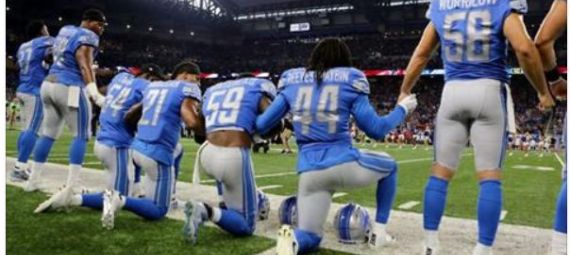We live in a time of nationalism. Red, white, and blue flow through our veins. Recently, we had a national debate: is it patriotic to protest racial inequalities in America by kneeling during the Star Spangled Banner, or is it better to stand in order to support lasting values we hold dear? Both sides saw their view as patriotic, though in different ways. What we don’t realize is that it doesn’t matter. We are already under judgment. The real question is: is our patriotism directed towards the U.S. or is our first loyalty to the gospel? (Reflections on the Sunday of Judgment)
—
How to Have a National Conversation?
In 2016, a football player by the name of Colin Kaepernick started a national debate. He was upset with racial justices he saw in America. In order to draw attention to the matter, and hoping to a difference, he decided to kneel during the national anthem at N.F.L. games.
In his mind, as well as those supporting him, kneeling was a respectful way of continuing to acknowledge the greatness of America, yet, at the same time, begin a national conversation about race in America.
Not everyone agreed. Others saw the act of kneeling as disrespectful. For them, the hard work and sacrifice of our American forbearers – especially those who had served and died in military service – always deserved the greatest respect: standing during the anthem. There are other ways, they argued, to begin a national conversation.
This debate rages on through social media, ordinary conversations, newspaper editorials, and even last week’s State of the Union address.
If we’re fair, both sides are squarely within our American tradition. Both sides are patriotic, wanting the best America possible for every American.
Originally, the idea was to start a conversation on racial inequality in America, but the reality is, it started a second national debate as well.
“What does it mean to be a loyal American?” “What does it mean to live out life, liberty, and the pursuit of happiness?” “How does one truly embrace being an American?” “Are there limits to freedom of speech?”
This debate got quite ugly – and it still is. Both sides are accusing the other of being “un-American” and “unpatriotic.”
A First Century Conversation on Patriotism
This sort of debate is not unique. In the first century – the time of Jesus – the Judeans were having a similar debate: “What does it mean to be a people of God?” “We’re under Roman occupation, so is God with us or against us?” “How can we best be loyal to God and maintain peace with foreigners?”
The context of the debate centered on Judean identity, which, in turn, was told through story. We know this story from the Old Testament, but, for them, it was a roadmap that explained where they’ve been, who they were, and where they were going. The big question was: where were they on the map?
The narrative, in short, goes something like this:
Israel, as a national identity, was formed at the base of Mt. Sinai. Moses had gathered the people to give them the law. In a way reminiscent of prophetic oracles, Moses predicted good times and bad times.
The good times were given as blessings:
And if you obey the voice of the LORD your God, being careful to do all his commandments which I command you this day, the LORD your God will set you high above all the nations of the earth. (Deuteronomy 28:1 RSV)
The bad times were given as curses:
But if you will not obey the voice of the LORD your God or be careful to do all his commandments and his statutes which I command you this day, then all these curses shall come upon you and overtake you. … And the LORD will scatter you among all peoples, from one end of the earth to the other; and there you shall serve other gods, of wood and stone, which neither you nor your fathers have known. (Deuteronomy 28:15, 64 RSV)
By the first century, it seemed these good times (the united monarchy) and bad times (exile to Assyria for Israel and to Babylon for Judea) had come about.
But there was more thing to come to pass:
And when all these things come upon you, the blessing and the curse, which I have set before you, and you call them to mind among all the nations where the LORD your God has driven you, and return to the LORD your God, you and your children, and obey his voice in all that I command you this day, with all your heart and with all your soul; then the LORD your God will restore your fortunes, and have compassion upon you, and he will gather you again from all the peoples where the LORD your God has scattered you. (Deuteronomy 30:1-3 RSV)
There was to be an end to the exile and a restoration of Israel as a people of God. The problem: some thought it had come about with the fall of the Babylon Empire to the Persians. Many Judeans had returned home to Jerusalem, and a second temple had been built. And, by the time of Jesus, they had a king – Herod – albeit not fully Judean and subservient to Rome, but a king, nonetheless.
Others weren’t quite so convinced. Perhaps they had returned from exile, but restoration had yet to happen. Some communities, such as the Essenes (the authors of the Dead Sea Scrolls) saw things differently. God’s glory had not yet returned to the temple, and they didn’t fully govern themselves – to them, Herod was a joke – so, the curse continued.
Just as in American now, a national debate about patriotism, loyalty, and what it means to be a good citizen was raging: each side accusing the other of betrayal.
How to Proclaim the End of Exile?
As tensions grew, a new community appeared on the scene. They followed a peasant carpenter and called him the Anointed one (Messiah or Christ), a title reserved for the true king of Israel. They also called him “Son of Man,” a title used in the book of Daniel to refer to a strange figure who sits, not just on a kingly throne, but on God’s throne.
And, perhaps, in the most shocking move of all, this Anointed one proclaimed the end of different sort of exile: death. This was the beginning of true restoration, not just for Israel, but for all people. His kingdom was already reigning and the world was within his domain.
In this kingdom, petty debates about politics no longer mattered. Even Rome, ultimately, no longer matters.
The surprise: we are all citizens and already under the judgment of this King:
Before Him will be gathered all the nations, and He will separate them one from another as a shepherd separates the sheep from the goats, and He will place the sheep at His right hand, but the goats at the left. Then the King will say to those at His right hand, ‘Come, O blessed of My Father, inherit the kingdom prepared for you from the foundation of the world; for I was hungry and you gave me food, I was thirsty and you gave Me drink, I was a stranger and you welcomed Me, I was naked and you clothed Me, I was sick and you visited Me, I was in prison and you came to Me.’ (Matthew 25:32-36 RSV)
The most striking part of this passage is that these righteous people don’t respond with, “Yippee!” but with, “When did we do such things?”
Jesus’s kingdom is not reserved for an after-life, other-worldly, heavenly realm. This kingdom is coming to bear on us now, today. Whether we’re good or bad, the King has already issued a decree.
Living Under a New King
Believing we’re citizens of America, we actually find our true citizenship elsewhere. The real question: how will we respond to this proclamation?
It’s no accident, I think, that the lectionary readings leading up to this Sunday come from the first epistle of St. John. Here, we are given the law of our true homeland. We hear the King decree His justice:
Beloved, I am writing you no new commandment, but an old commandment which you had from the beginning; the old commandment is the word which you have heard. Yet I am writing you a new commandment, which is true in Him and in you, because the darkness is passing away and the true light is already shining. (1 John 2:7-8 RSV)
For this is the message which you have heard from the beginning, that we should love one another, … By this we know love, that He laid down His life for us; and we ought to lay down our lives for the brethren. But if anyone has the world’s goods and sees his brother in need, yet closes his heart against him, how does God’s love abide in Him? Little children, let us not love in word or speech but in deed and in truth. (1 John 3:11, 16-18 RSV)
For this is the message which you have heard from the beginning, that we should love one another, … And this is His commandment, that we should believe in the name of his Son Jesus Christ and love one another, just as He has commanded us. All who keep His commandments abide in Him, and He in them. And by this we know that He abides in us, by the Spirit which He has given us. (1 John 3:11, 23-24 RSV)
So, when we get to Matthew 25 on this Sunday of Judgment, we have no excuse. If we are found lacking, we are cast into the fire reserved for the devil.
It is as citizens of God’s kingdom, in the here and now, that we are to respond. If we cannot receive Jesus and those around us today, it will not be good news for us later.
Ultimately, it doesn’t matter if we stand or kneel for the national anthem. The real question is, do we love those with whom we both agree and disagree? Are we willing to give up the comforts of this life, for a kingdom that is already coming to bear on us? Are we willing to see the person in need next to us, not only as a neighbor but also as a brother or a sister? Is compassion our way of life, or simply an ideal we ignore?
This Lent, may our eyes be opened to see this life as under the judgment and rule of the true Anointed King, Jesus, and may our law be the commandment of love.
P.S. Love Neighbor And God!
How we live our lives in the here and now make a difference, not only for our “salvation” but also for the Kingdom of God. We may find ourselves debating politics, issues, and other things of our day, but ultimately, it doesn’t matter. On Judgment Sunday we see the power of the true kingdom. The real question will be: how did you love God and neighbor?
One of the great American Orthodox scholars of our day, Fr. Alexander Schmemann, once wrote, “Christ left his disciple not a doctrine of individual salvation, but a new commandment, ‘that they love one another’.” That’s our challenge today.




















